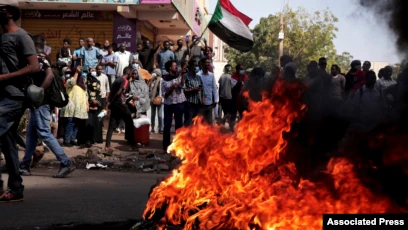At least seven protesters have been shot dead after clashes erupted between Sudan’s security forces and people taking part in rallies against the October military coup in the capital Khartoum and the city of Wad Madani.
The independent Sudanese Doctors’ Central Committee said on the Facebook page of Khartoum state’s health ministry on Monday that the protesters “were killed by live bullets” by “militias of the putschist military council.”
This brought the death toll of protesters killed since last year’s military coup to 71, the medics added.
According to an AFP correspondent, Sudan’s security forces fired volleys of tear gas at protesters who were heading toward the presidential palace in Khartoum, causing several injuries.
A number of others also suffered breathing difficulties due to inhaling tear gas.
“Around 2,000 people took to the streets as they called for civilian rule,” said a witness in Wad Madani.
Thousands of protesters demanded that the military return to their barracks and chanted “the rule is that of the people’s” in North Khartoum, witnesses said.
The latest rallies were held ahead of a visit by US diplomats seeking to revive a transition to civilian rule. US envoy to the Horn of Africa David Satterfield and Assistant Secretary of State for African Affairs Molly Phee are expected in the capital this week for meetings with pro-democracy activists, civic groups, military and political figures.
“Their message will be clear: the United States is committed to freedom, peace, and justice for the Sudanese people,” the US State Department said.
More than two years ago, massive anti-government demonstrations hit Sudan, mostly over economy. The protesters, youths for a large part, demanded the resignation of then President Omar al-Bashir.
Bashir was ultimately deposed through a military coup in April 2019, after ruling over the country for three decades. In August the same year, a transitional civilian-military administration was founded to run the country.
However, Sudan’s military chief and de facto leader Abdel Fattah al-Burhan staged a coup on October 25 and dissolved the fragile government.
Abdalla Hamdok, the then-prime minister, was detained and put under house arrest in a move that infuriated the Sudanese and sparked international outcry, including from the UN Security Council. Other civilian leaders were also held in military detention.
Hamdok was later released and on November 21 signed a power sharing deal with the Burhan-led junta, according to which the former would continue his career as prime minister, all political prisoners detained during the coup would be released, and a 2019 constitutional declaration would be the basis for a political transition. According to the deal, July 2023 has been set as the date for Sudan’s first free elections since 1986.
Protest rallies against the coup have continued even after the reinstatement of Hamdok, with demonstrators demanding no military involvement at all in government. They say the deal has simply given a cloak of legitimacy to the generals, who they accuse of trying to form an autocratic regime like the one led by ousted Bashir.
Earlier this month, Hamdok resigned, leaving the military fully in charge. He said Sudan was at a “dangerous crossroads threatening its very survival.”
READ ALSO: Syria says US So-Called “Democracy Summit” Lacks Int’l Legitimacy
Sudan’s anti-coup rallies have been held despite heavy presence of the military, police and paramilitary forces.
The United Nations has already called on the security forces to refrain from violence.
Last month, Burhan issued a decree allowing security forces to detain individuals “over crimes related to the state of emergency,” a move that effectively banned street protest rallies.
He insists that the October military takeover “was not a coup” but only meant to “rectify the course of the Sudanese transition.”













